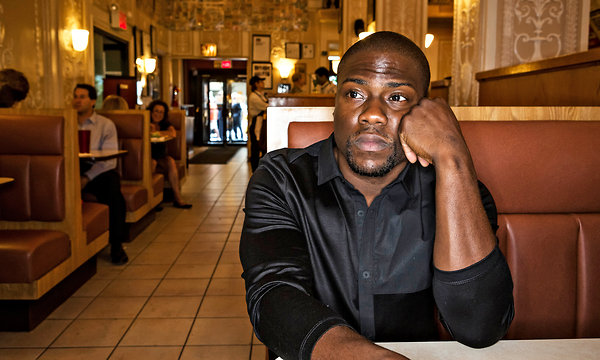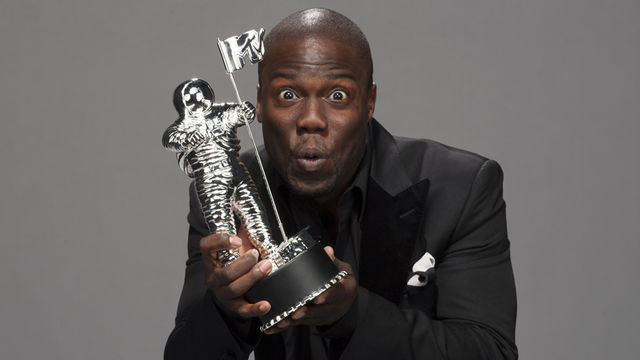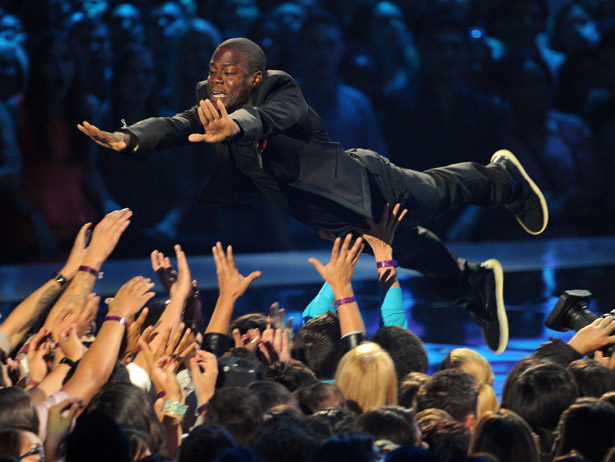It’s safe to say that Kevin Hart that is one of the funniest men in America. That’s usually the general public’s perception when you are confirmed to host the 2012 MTV Video Music Awards a year after hosting the BET Awards. Let’s not forget his acting role in the hit romantic comedy film, “Think Like a Man,” which made its number one debut at the box office in April and has grossed more than $95 million to date.
 Last month, David Itzkoff of The New York Times spoke with Hart at a Manhattan restaurant in the midst of his preparation for MTV’s most important show. Itzkoff is accustomed to covering comedians, as he has already completed funny features on Jerry Seinfeld, Louis C.K. and his most recent conversation with Chris Rock in August. Hart’s comedy isn’t as hilarious on paper as it is when he brings the sketches to life through his live stand-up act. That may be the reason why Itzkoff provided links to Hart’s routine from his “Laugh at My Pain” concert film in the online version of the story that appears on NYTimes.com. You can witness the 5-foot-5-inch comedian darting across the stage with huge oversized eyes, making ridiculous noises as he impersonates the flaws of his family members in front of an audience that can’t contain their laughter. This is nothing new to Hart since “Laugh at My Pain” not only surpassed expectations but showed that he was remarkably able to turn big laughs into big business as the movie brought in more than $.7.7 million after costing nearly $700,000 to make. I spoke with Itzkoff about how he was able to take Hart seriously for his story without giggling throughout the entire process.
Last month, David Itzkoff of The New York Times spoke with Hart at a Manhattan restaurant in the midst of his preparation for MTV’s most important show. Itzkoff is accustomed to covering comedians, as he has already completed funny features on Jerry Seinfeld, Louis C.K. and his most recent conversation with Chris Rock in August. Hart’s comedy isn’t as hilarious on paper as it is when he brings the sketches to life through his live stand-up act. That may be the reason why Itzkoff provided links to Hart’s routine from his “Laugh at My Pain” concert film in the online version of the story that appears on NYTimes.com. You can witness the 5-foot-5-inch comedian darting across the stage with huge oversized eyes, making ridiculous noises as he impersonates the flaws of his family members in front of an audience that can’t contain their laughter. This is nothing new to Hart since “Laugh at My Pain” not only surpassed expectations but showed that he was remarkably able to turn big laughs into big business as the movie brought in more than $.7.7 million after costing nearly $700,000 to make. I spoke with Itzkoff about how he was able to take Hart seriously for his story without giggling throughout the entire process.
You’ve accomplished a lot in a very short amount of time. Tell me about some of the work you’ve done.
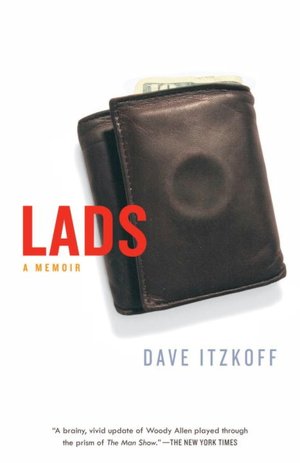 I graduated from Princeton in 1998. My first job in publications was as the editor in chief at Details magazine in 1999 for about six months. I went on to work for Maxim for three years and when I left Maxim I wrote an essay for the New York press about my experience working there and my dissatisfaction with the whole conceit of that magazine and men’s magazines in general and the error of the lad magazine. That later became a book that was published in 2004 called “Lads: A Memoir of Manhood.” While I was writing that book I was also working as an assistant and associate editor at Spin magazine and that was up until 2006. I was freelancing for The Times and then I spent one year at the Times as an editor in the Styles section between 2007 and 2008. In 2008, I became a cultural reporter for The Times and I’ve been here since then.
I graduated from Princeton in 1998. My first job in publications was as the editor in chief at Details magazine in 1999 for about six months. I went on to work for Maxim for three years and when I left Maxim I wrote an essay for the New York press about my experience working there and my dissatisfaction with the whole conceit of that magazine and men’s magazines in general and the error of the lad magazine. That later became a book that was published in 2004 called “Lads: A Memoir of Manhood.” While I was writing that book I was also working as an assistant and associate editor at Spin magazine and that was up until 2006. I was freelancing for The Times and then I spent one year at the Times as an editor in the Styles section between 2007 and 2008. In 2008, I became a cultural reporter for The Times and I’ve been here since then.
You spoke of your dissatisfaction with some of those men’s magazines. What was the issue that you had with them?
I thought that they were completely dishonest in representing the lives of young men. Maxim, in particular, puts forth this idea that when you are a young man in your twenties that life is this endless party and here’s how to score all the hot babes and they are just waiting to fall into your lap and here’s what they look like in photographs. None of that is true, at least as far as my experience at that age, and actually being somebody in its target demographic while working for the magazine. All of my personal experiences at the time and my experiences at the magazine were not in any way consistent with the philosophy that it was trying to portray.
Were you able to make efforts while you were there to change that perception?
There was tremendous resistance. I wasn’t really in charge of anything. I think the highest title that I had at Maxim was associate editor which is pretty much middle of the ladder if that. I think at the time the magazine could have gone in one of two ways. On one hand, it aspired to be snarky and comedic and a funny magazine in the lane of a National Lampoon that seemed to be the more admirable path. The other road was just totally wallowing in this party atmosphere and being the kind of thing you would find on a fraternity bedroom floor. Through a combination of deliberate choices and happenstance that’s the path that they took and that’s where I guess they felt that the most profitable lay.
Tell me about the most interesting story you’ve written or the one that garnered the most attention thus far?
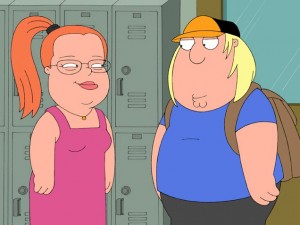 On February 20, 2010 I wrote a front page story about this conflict that had grown out of an episode of “Family Guy” where one of the characters on the show had Down syndrome and Sarah Palin and her daughter were criticizing the show. There’s a joke in the show where the character makes reference to being the daughter of the former governor of Alaska. Sarah Palin and her daughter thought it was somehow mocking her so that one episode of this cartoon show became an unlikely catalyst for this huge debate about the depiction of disabled people in comedy, in cartoons, on “Family Guy,” and on Fox where Sarah Palin has her own business relationships with Fox News so all of these things came out of one random joke on “Family Guy.” That was really fascinating to dive into.
On February 20, 2010 I wrote a front page story about this conflict that had grown out of an episode of “Family Guy” where one of the characters on the show had Down syndrome and Sarah Palin and her daughter were criticizing the show. There’s a joke in the show where the character makes reference to being the daughter of the former governor of Alaska. Sarah Palin and her daughter thought it was somehow mocking her so that one episode of this cartoon show became an unlikely catalyst for this huge debate about the depiction of disabled people in comedy, in cartoons, on “Family Guy,” and on Fox where Sarah Palin has her own business relationships with Fox News so all of these things came out of one random joke on “Family Guy.” That was really fascinating to dive into.
How did this piece on Kevin Hart come about?
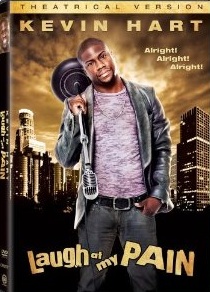 He’s somebody I’ve had my eye on for a long time. The first thing I remember seeing him in was the show “Party Down” where he played the rapper who had been hired to perform at this spoiled girl’s Sweet 16 party and he was a huge standout in that episode. Then certainly last year when “Laugh at My Pain” was blowing up it was kind of like, “This guy is for real!” This is obviously somebody who is pretty important and is going to continue to be important. Certainly that year’s MTV awards is kind of an interesting moment as well because he had a pretty prominent place in the show but he wasn’t actually called the host of the show. I think had he hosted the show or had they given him that kind of prominent a platform maybe that would have been the time to come to him. We started hearing rumblings over the summer that they were looking to come back to him this year to be the full official host. Once we heard about that and I spoke to my editors and colleagues here saying that if this comes together this would be a wonderful opportunity to do a big piece on him. He’s not somebody that we’ve written about at great length. We had a review of “Laugh at My Pain” when it came out that I thought was really good and touched on a lot of what was good about him and this would be an opportunity to explore him a little bit more and talk about who he is and let him talk about himself in his own words.
He’s somebody I’ve had my eye on for a long time. The first thing I remember seeing him in was the show “Party Down” where he played the rapper who had been hired to perform at this spoiled girl’s Sweet 16 party and he was a huge standout in that episode. Then certainly last year when “Laugh at My Pain” was blowing up it was kind of like, “This guy is for real!” This is obviously somebody who is pretty important and is going to continue to be important. Certainly that year’s MTV awards is kind of an interesting moment as well because he had a pretty prominent place in the show but he wasn’t actually called the host of the show. I think had he hosted the show or had they given him that kind of prominent a platform maybe that would have been the time to come to him. We started hearing rumblings over the summer that they were looking to come back to him this year to be the full official host. Once we heard about that and I spoke to my editors and colleagues here saying that if this comes together this would be a wonderful opportunity to do a big piece on him. He’s not somebody that we’ve written about at great length. We had a review of “Laugh at My Pain” when it came out that I thought was really good and touched on a lot of what was good about him and this would be an opportunity to explore him a little bit more and talk about who he is and let him talk about himself in his own words.
I know you didn’t name the location of the interview in the story. Can you tell me where it took place?
We got together at a restaurant called Sophia’s which is in the Hotel Edison in Times Square and that would have been on August 13.
Were there any restrictions given to you prior to the interview?
It didn’t come up in this scenario. He was in town specifically to start working on some of the promotional videos and advertisements for the VMA’s and we had to sort of work against that schedule and I’m fairly certain he was in the Times Square area because that’s where the MTV offices are. It was a good halfway point where the Times building is and where the MTV building is. It was just mutually convenient.
Chad Batka took photos of Kevin at the restaurant and there appears to be people eating in the background.
Yeah, they gave us a little bit of time before we sat down for lunch. He was in the hotel bar which I believe is called The Rum house and that’s where the photos were taken and I came in at the tail end of the shoot. Chad, who I’ve worked with in the past, is just fantastically talented and just a really gifted portrait photographer and it looked like the two of them were hitting it off.
As people are seeing this happen are they interrupting you guys?
At that time of day, there wasn’t anybody in the bar. I don’t think they formally opened for business. It’s conceivable that people could have been walking by and looking in the window and realizing that’s Kevin hart is in there. The only interruptions were the other members of Kevin’s team sharing their cell phones or this communal iPad they were passing around when they would get good news or an important e-mail would come through. That’s totally permissible. It’s a working day for him and you’ve got to let the guy conduct his business.
This article was published on August 30, a few days before it was available in print. I found your placement of YouTube links in the story to be quite interesting.
We are encouraged to take advantage of the webiness of it all. For people who are reading it online that built an expectation. You expect there to be links and you want to be able to click on that portion of text and see the routine that we are talking about.
Were you aware of his father’s past drug addiction prior to the interview?
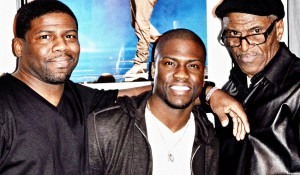 Sure. Obviously I knew about it from the routine that he performs in “Laugh at My Pain.” His dad appears at the very end of the movie in that interview with Larry King. His dad is so prominent in the act and seeing him in the film it’s something he would probably expect to be asked about and he had a tremendously positive attitude about that portion of his life and about his relationship with his father now. It wasn’t necessarily anything I thought he would be uncomfortable discussing and clearly he wasn’t.
Sure. Obviously I knew about it from the routine that he performs in “Laugh at My Pain.” His dad appears at the very end of the movie in that interview with Larry King. His dad is so prominent in the act and seeing him in the film it’s something he would probably expect to be asked about and he had a tremendously positive attitude about that portion of his life and about his relationship with his father now. It wasn’t necessarily anything I thought he would be uncomfortable discussing and clearly he wasn’t.
You highlight a lot of Kevin’s accomplishments but what was his big breakout moment?
He points to a number of different moments. It was a flurry of specials he did leading up to “Laugh at My Pain.” “Grown Little Man” obviously is a big one for him and he also talked about doing Shaq’s “All-Star Comedy Jam” which is sort of an ensemble almost like “The Original Kings of Comedy” with him and Tommy Davidson and a couple of other performers all doing stand-up sets but in the course of one film and he felt like that helped him get in front of a wider audience. It’s a progression of those stand-up specials and the increased visibility that they brought him through his specials getting rerun on Comedy Central and more people seeing him that way. Obviously “Laugh at My Pain” is the moment where if you didn’t know about him already you knew about him then. That was the moment that put him over the top. This guy is here and he’s sticking around for a long time.
For this piece you were able to speak to Steve Harvey. I know you were able to get some great quotes there. Did you leave anything out that was meaningful?
When you talk to a guy like Steve Harvey obviously you are going to come away with a lot of great stuff and your challenge is to find the single best thing that he said or the most colorful that says the most about Kevin. The story he told me about their encounter is the best one. He said something about Kevin to the effect of, “He’s got the dog in him.” That was a great line talking about his tenacity and his energy and his persistence. If I had another 50 or 60 words I would have found a way to work that in but whatever you can get from Steve Harvey is a bonus.
Kevin went through a divorce that he briefly joked about at the BET Awards last year and people didn’t believe it at first. You didn’t ask him about that. Was that intentional?
That was not something I got into with him. There’s so much on the table with Kevin in a sense. There’s so much of his life that he puts out there in different ways. If that were more of his public persona and his stand-up persona and that reflected more directly in his act, like his father’s drug addiction did or his mother’s death and her funeral, maybe then that’s fair game for a conversation. Anytime you talk to an individual there’s that boundary or that nebulous borderline of what’s private and what’s public. If I had delved into it further with him maybe he would talked about it as candidly as any of the matters I mentioned but because those things are so prominent in his act those felt like the things to talk about and at a certain point you can only ask a person to unveil so much of themselves and anything beyond that I think would have been masochistic to expect to just unfurl everything in a single conversation.
Are you dying laughing during this interview or is it not what we expect?
He definitely was having a good time and it’s not any credit to me. I think just being in a restaurant and having a couple of guys from his team there. He definitely has a very teasing relationship with his coworkers. He and Wayne (his executive assistant) will get into it a little bit or he and Harry (director of operations for team Hart) will get into it and they are throwing insults back and forth. He’ll go off to the bathroom and come back and make some comments about that. He’s having a good time even as he’s answering some very personal and sincere questions.
You spoke to Stephen Friedman who is President of MTV and he talks candidly about why Kevin was the right choice to host this year’s VMAs. But Kevin hosted the BET Awards last year and networks always like to be the first to do something creatively. Why did they choose him now?
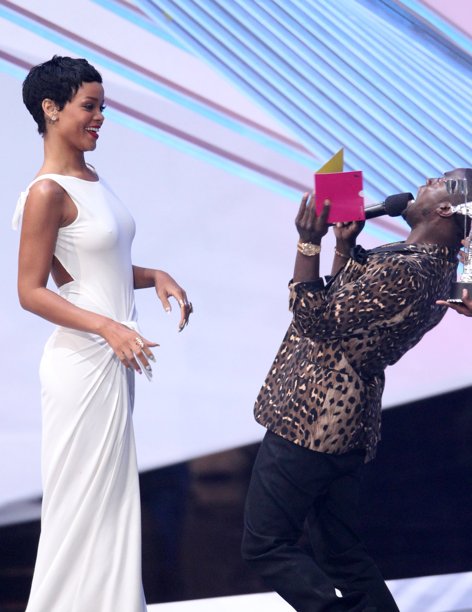 That’s a really good point. I am still curious about it myself. The way MTV explains it he is someone they had their eye on going back to last year and they say they came to him very late as far as the 2011 MTV Awards where they felt like they were just going to have a schedule full of other performers. They weren’t even sure they wanted a host then at the last minute they wanted an open monologue. That’s where they came to Kevin and they are grateful that he was willing to do it at that late stage and that’s what kind of turned them onto him. I can’t imagine how they couldn’t have already noticed the tremendous job he did at the BET Awards last year and all the attention he got for “The Real Husbands of Hollywood” and all of that stuff. They want somebody who is first of all funny. Second of all, they want someone who can bring celebrities into the performance in different ways and make their celebrity talent feel comfortable. You can certainly go to the past history of the VMAs where they had other hosts who were very funny but maybe gave opening monologues that were a little more scathing and maybe risked alienating the people that MTV wants to be able to continue to do business with. I don’t think he’s that kind of guy. He can make fun of you to your face and make you feel good about it.
That’s a really good point. I am still curious about it myself. The way MTV explains it he is someone they had their eye on going back to last year and they say they came to him very late as far as the 2011 MTV Awards where they felt like they were just going to have a schedule full of other performers. They weren’t even sure they wanted a host then at the last minute they wanted an open monologue. That’s where they came to Kevin and they are grateful that he was willing to do it at that late stage and that’s what kind of turned them onto him. I can’t imagine how they couldn’t have already noticed the tremendous job he did at the BET Awards last year and all the attention he got for “The Real Husbands of Hollywood” and all of that stuff. They want somebody who is first of all funny. Second of all, they want someone who can bring celebrities into the performance in different ways and make their celebrity talent feel comfortable. You can certainly go to the past history of the VMAs where they had other hosts who were very funny but maybe gave opening monologues that were a little more scathing and maybe risked alienating the people that MTV wants to be able to continue to do business with. I don’t think he’s that kind of guy. He can make fun of you to your face and make you feel good about it.
Your piece highlighted the fact that Kevin’s audience is become more diverse now. Did he express any concern about possibly losing his core audience?
It’s not about bringing in more audience members of any particular color or ethnicity but reaching as broad of an audience as he can. Coming out of Philly and the kinds of performances that he grew up enthralled by is interesting. He mentions Chris Tucker and J.B. Smoove. I haven’t seen those early performances. I would love to. But I can imagine that he must have sounded and looked very different when he started.
You just mentioned Chris Tucker who has resisted going back to the Smokey character from “Friday” that was raw and urban but made him a household name in Hollywood. Do you get the sense that Kevin won’t do certain things now because it may be a huge risk to his rise in comedy?
That’s a really good point. As best as I can tell it looks like he has got that under control. He certainly is succeeding at that. You see it in some extent in “Laugh at My Pain.” Those documentary portions where he goes back to Philly and is just walking around and saying hi to people and going into the restaurants and his high school and all that seemed like a very conscious way of saying: “I’m never going to forget this! I’m never going to fully leave it behind. It’s always going to be a part of me no matter what I go on to.” I think he is somebody who has managed to find ways to bring in other audiences and connect with people who didn’t necessarily see him in the Laff House era. I don’t think he will ever cut ties with that part of his life.
Team Hart is doing big business right now as Kevin owns his own independent film company with Hartbeat Productions and has creative control over his own projects. Did he discuss any of that with you?
Obviously we didn’t unpack that too much in the story. He told me that the budget for “Laugh at My Pain” was $700,000 and in terms of the gross box office receipts they got ten times back on that which is pretty good. A Hollywood movie would love that if they could. In all likelihood that means that you are going to see a commensurate increase that means he can spend more on the next concert film. They can play it in more theaters and potentially do bigger business than that but the success of a film like that can have an impact on your touring. You can play bigger venues and play in more places not only nationally but worldwide and potentially charge more at the door for your tickets. There is a lot of profit potentially to be made there.

